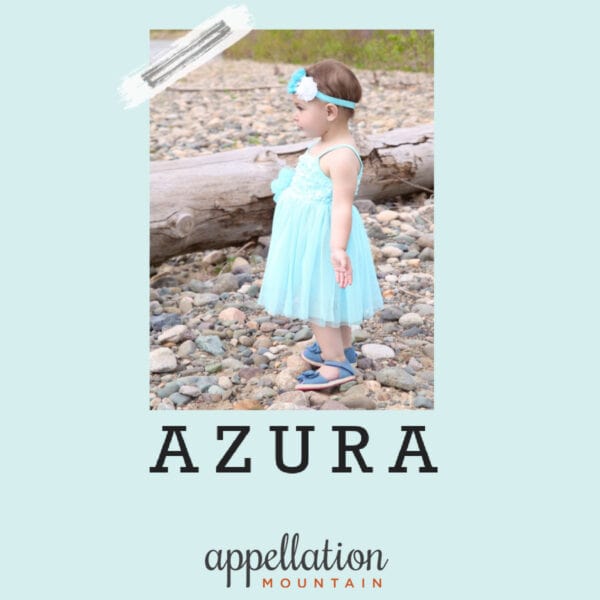 Mila blends the traditional and the modern, a straightforward name that’s less expected than Emma or Ella, but every bit as wearable.
Mila blends the traditional and the modern, a straightforward name that’s less expected than Emma or Ella, but every bit as wearable.
Thanks to Meryl for suggesting her daughter’s name as our Baby Name of the Day.
Nineteenth Century Rarity
Mila appeared in the US Top 1000 just once, in 1881, and then disappeared for more than a century.
Except odds are that the name wasn’t really gone. After all, it’s long served as a short form of names that begin and end with the letters. Milena and Camila, Amelia and Milicia, there’s no shortage of names that can slim down to Mila.
Many of the common names beginning with Mil- share an appealing meaning: dear, from the Slavic milu. But the letters and sounds occur in plenty of names, across culture and times, so meaning can prove elusive.
Twenty-First Century Favorite
This name’s success owes more to sound than meaning.
In the early twenty-first century, it started to rise. Not just in the US, but internationally. It climbed in Belgium and France, Switzerland and Sweden, Scotland and Slovenia. It gained throughout the English-speaking world, too.
The name had history aplenty. Some of its enduring appeal is thanks to Croatian folk hero Mila Gojsalić. As a young woman, her town was facing attack by the Ottoman army. She infiltrated their camp, blew up their munitions, and created enough of a surprise that the locals had time to counter-attack. That was way back in 1530; her memory is kept alive in legend, as well as an opera, a statue, and an annual celebration in her hometown. (Thanks to Bird for pointing her out!)
What explains the global rise of this mini name? It follows two sound-alikes up the charts.
Maya and Mia
First came Mia, a name put on the map by actor Mia Farrow. She became an overnight sensation in 1960s mega-hit television drama Peyton Place. The name spiked into the US Top 1000 in 1964, the same year the series debuted. But it never slowed down, entering the Top 100 in 2000, and the Top Ten in 2009.
Then came Maya, a nicely international name that entered the US charts in 1970. I’m less clear about what put Maya on the map. The timing suggests Maya Angelou gets credit; her legendary work, I Know Why the Caged Bird Sings, was published in 1969. Again, the name continued to catch on as the years passed.
By 2002, Maya had entered the Top 100, where it remains today, not too far behind Mia.
Doubtless Maya owed a little something to Mia. And both paved the way for our featured name, too.
Mila Kunis
In 1998, Ukrainian-born actor Milena Kunis got her big break on That ’70s Show. (So did her future husband, Ashton Kutcher.) Mila Kunis has remained in the spotlight, from comedies like Bad Moms to celebrated films like 2010’s The Black Swan.
The rise in Mila tracks. It debuted in the US Top 1000 in 2006, just as That ’70s Show was wrapping its run, and Kunis was transitioning to movies.
Just like Mia and Maya, though, this name continued to gain in use long after the initial spark.
One L or Two?
Another factor explaining the name’s success? Another Ukrainian-born celebrity, model-turned-actor Milla Jovovich. Born Milica, Jovovich pronounces her name similarly, but spells it with two Ls instead of one.
While Milla has never caught on as an independent name in the US, Jovovich’s career arc also matches up with the rise of Mila. She co-starred in blockbuster The Fifth Element in 1997, took the lead in the Resident Evil franchise in 2002, and was very much in the spotlight as the single-L spelling of the name reached the Top 1000.
By the Numbers
Today, the names look like this:
- 12,642 girls were named Mia, down from a peak of nearly 15,000 in 2015.
- Factor in an additional 3,882 girls named Maya, down from a peak of just over 5,000 in 2006.
- Now add in 8,126 Milas – a new high for the name.
Just 51 girls were named Milla. We probably tend to pronounce Milla more like Ella, Stella, and Willa, which makes that spelling a little different.
I’d guess this sound dominates at some local playgrounds, and kindergartens with more than one of these popular names. Depending on how you measure change in popularity, this ranks as one of the fastest rising names of the last two years.
Modern Mila
And yet, Mila shows no signs of slowing down. The name connects to so many longer forms, which helps it cross cultures and languages, from Slavic to Spanish. It appeals to parents after something short and sweet. And while it’s not as dramatic as, say, Seraphina or Persephone, there’s something just slightly different and distinctive about this name, too. The only real downside is that so many parents have discovered this name’s considerable charms.
Would you consider Mila for a daughter? Or do you like Maya or Mia better?
First published on June 9, 2011, this post was revised substantially and re-published on June 19, 2019.





We named our third Camila, and we call her Mila (mee-lah). We love it. We considered Milena as well.
I didn’t realize Mila was fast-rising! Hopefully when she’s older the pronunciation thing won’t be a prob 🙂
So far people are good at not butchering her name and just saying it the same way that I introduce her 🙂
I haven’t met any other Milas (yet)!
Here’s some more about the name Mila, which has been in use since the 16th century:
What Joanne d’Arc is for France, Mila Gojsalic is for Croatia.
Mila’s origins are from village Kostanje in Dalmatian hinterland and she was a distant descendant of Croatian king, Gojslav. In 1530 Ottoman Ahmed-pasha gathered an army of 10,000 men with a goal to conquer Poljica. He made camp in a place called Podgrac. Mila Gojsalic was among other local women forced to lose their virginity with Ahmed-pasha. Because of that act she infiltrated the Turkish camp and blew up the munitions stockpile, killing Ahmed-pasha and numerous officers and soldiers. That act completely surprised and confused the remaining Turkish soldiers who were then overrun by the people of Poljica. With this act, Mila became a legend of courage, love and sacrifice, not only for the people of Poljica, but also for Croatia. Jakov Gotovac made an opera in her honor. In her birthplace every summer there is a cultural manifestation called The days of Mila Gojsalic. She is remembered much like the Old Testament’s Judith and France’s Joanne d’Arc.
My daughter’s name is Mila. She is almost eternally called My-la. I wanted an adorable name that was different but I am sure she would be happy with her name becoming popular as some people would begin to properly pronounce it. She is 9 and her full name is Mila Kate.
I have a friend named Mila and she hates her name. People always call her “my-lah” or “mil-a”. Never the correct pronunciation.
I hope most people are unaware that Milena is Mila Kunis’s given name (I didn’t know it prior to reading this post!). This name has been stored into my “names to give my future children someday” vault since I was ten or so. If Milena has managed to inch its way up into the Top 200 by the time I have a daughter, I don’t think I would use it as a first name… Or maybe I’d still love the name so much I’d use it anyway, as long as it hasn’t become too popular. (e.g. Isabella’s no.1 VS. Eloise’s rising up the charts). I actually prefer the nickname Lena to Mila and would use that instead..
We have a 2 yo Milena nn Mila. I thought we might use Lena as the short form, but Mila just came naturally. Both Milena and Mila work really well for our family since we have French, Spanish, and Italian speaking relatives who can all pronounce them perfectly. In fact, we were surprised to find that so many Americans have a hard time. We hear “meleena,” “mylayna,” “milla,” and “myla” far too often! But no matter. Usually one correction does the trick, and I really couldn’t imagine her being named anything else!
And I also agree there’s a proliferation of Mi- names at the moment (which does make me occasionally wish I’d been a little more original). The other week I went to an open playgroup where Mila played with Mia, Mischa (love this name), Maya (pn. My-ah) and Michaela. Arrggh!
Thanks for this post.
Oh oh oh! I nearly missed this! 🙂
We pronounce Mila’s name “Meela” as well… Though people often pronounce it a bit like “Miller”. It’s a minor inconvenience for having a name outside of the top 100. One birthday on and I still love her name (though I wish I’d given her a second middle name as well as the one she already has – Arden).
We actually chose her name for the meaning “miracle”, which comes from the Spanish Milagro/Milagra.
Lemon – we had Nina on our shortlist too, I agree they are similar in style.
Meryl, the Milagro connection is interesting – I didn’t come across it anywhere, but it is perfectly reasonable – and really a lovely meaning.
I adore the pairing Mila Arden – poetic.
I definitely prefer the sweet Mila to the newly coined Miley and overused Mia. I think I’d prefer it as a nickname rather than a given name; even by itself an increase in popularity wouldn’t be bad. To me the pronunciation seems obvious, but that’s probably just because of my upbringing/backgroun.
I have a cousin adopted from ethiopia. Her birth name was Hermela. She only goes by Mela, prn like Mila.
I think Mila is an interesting, fresh choice today in a sea of kaylee’s and madison’s. I adore it as a nn for Emilia.
One more example of how very, very portable Mila truly is!
Is there any consonant that couldn’t stand in for the L and be pronounced a beautiful name??? Let’s try
Miba
Mica
Mida
Mifa
Miga
Miha
Mija
Mika
Mima
Mina
Mipa
Miqa
Mira
Misa
Mita
Miva
Miwa
Mixa
Miya
Miza…lovely!